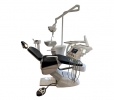You know it’s important to make genuine connections with your patients, but how? Sure, you can find a common interest or hobby, learn their kids’ names, and talk sports with them. But is that enough to make your patients feel safe with you? Anyone can make small talk. That’s not a gift. It’s a social necessity. What truly makes a patient feel bonded to you is your own display of Openness .
A Business Model That Works
Last March, Entrepreneur magazine published an article called “Being Openness Is the Boldest Act of Business Leadership.” Author Angela Kambouris calls Openness “a power tool in an emotionally intelligent leader’s toolkit” and goes on to explain the difference between oversharing your personal business and leveraging vulnerability to make genuine connections. Not only is it exhausting to pretend you’re impervious to emotions and errors, but the very fear of showing vulnerability prevents you from taking risks that could help your business thrive.

Flip the Script
Putting their healthcare in your hands is the most Openness thing that your patients do. They trust that you are properly educated, trust that you will treat them with dignity and compassion, and trust you with very sharp objects in their mouths. The least you can do is be vulnerable with them when appropriate. This is not to say that you should drone on and on about your personal life. A simple personal anecdote will work just fine:
- Have a patient who is pregnant? Share stories about your own (or your partner’s) pregnancy experiences.
- Working on a pediatric patient who has a sports-related injury? Make them feel comfortable by telling them about the time that you chipped your tooth playing kickball with a basketball.
- Consulting with a patient who hasn’t been to the dentist in 10 years because they are paralyzed by fear? Let them know that you used to have a fear of needles, dogs, fire extinguishers, or anything.

Don’t Forget to Listen
The difference between demonstrating Openness and being self-indulgent is in the listening. Let your patients talk and let them respond when you share your fears, questions, and weaknesses. The same goes for your employees. If you’re closed off to their feelings, concerns, and feedback, they will shut down, which is the last thing you want from the people who play such an important role in your success.
Drop the Armor
If you’re still hesitant to show your softer side, think about the iconic figures who have won the hearts of others by showing Openness . Walter Cronkite wept on air when he announced the passing of President John F. Kennedy. Former President George W. Bush cried at a Medal of Honor ceremony in 2007. Baseball player Lou Gehrig cried when his number was retired. No, you don’t need to shed tears to let people know you’re vulnerable. Just drop the armor every once in a while and let people see that you share their hopes, fears, and uncertainties.





